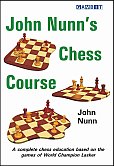 John Nunn's Chess
Course by John Nunn
2014
Gambit
Publications Ltd
John Nunn's Chess
Course by John Nunn
2014
Gambit
Publications Ltd
http://www.gambitbooks.com
E-mail info@gambitbooks.com
317 pages
Price €15,99
ISBN 978-1-906454-82-1
Grandmaster John Nunn provides the reader with a brilliant made chess
course based on the games of the legendary World Champion Emanuel
Lasker.
Emanuel Lasker was probably the strongest chess player of all time and
the secrets of his success did remain for many players a great mystery
but John Nunn writes:
In reality, there was nothing mystical or underhand about his
games;they where based on a deep understanding of chess, an
appreciation of deceptive
positions and some shrewd psychology.
Another myth for which there seems no real evidence is that Lasker
deliberately played bad moves in order to unsettle his opponents.
Certainly Lasker
played bad moves,as all chess players do from time to time,but the
point which struck me when analysing his games was how often he adopted
a safety first strategy.
Lasker was a great fighter and had a strong will to win, but his
winning efforts hardly ever crossed the boundary into recklessness; in
almost every case, he played moves that appeared provocative but where
no worse than the alternatives, with the important difference that they
were more likely to induce a mistake.
The reader will find the following readable chapters:Introduction: Why
Lasker,Misunderstood Genius,Attack and Defence,Piece Activity,Pawn
Structre,The Endgame, Bishop vs Knight, Queen less Endgames, Defending
Inferior Positions, Manoeuvring, Endgames:Make Something from Nothing,
Playing for the Win, Fleeting Chances,The Critical Moment, Common
Failing and not to forget a careful selection exercises, all with full
commentary and explanation.
It is difficult to see form here but every chapter in this book is
filled with highly instructive subjects.
This all is written to show how the most important chess concepts
operate in practice.
{Nimzowitsch did something similar in his book:My System and Chess
Praxis}
The book is not intended as a biography of Lasker but the fans will
certainly enjoy the high quality of Nunn his analyses.
One of my favourite game {fragments} is the world championship game
between Schlechter and Lasker of
Vienna 1910: Schlechter,Carl - Lasker,Emanuel [C66]
World Championship 10th GER/AUT (5), 21.01.1910
1.e4 e5 2.Nf3 Nc6 3.Bb5 Nf6 4.0-0 d6 5.d4 Bd7 6.Nc3 Be7 7.Bg5 0-0
8.dxe5 Nxe5 9.Bxd7 Nfxd7 10.Bxe7 Nxf3+
11.Qxf3 Qxe7 12.Nd5 Qd8 13.Rad1 Re8 14.Rfe1 Nb6 15.Qc3 Nxd5 16.Rxd5 Re6
17.Rd3 Qe7 18.Rg3 Rg6
19.Ree3 Re8 20.h3 Kf8 21.Rxg6 hxg6 22.Qb4 c6 23.Qa3 a6 24.Qb3 Rd8 25.c4
Rd7 26.Qd1 Qe5 27.Qg4 Ke8
28.Qe2 Kd8 29.Qd2 Kc7 30.a3 Re7 31.b4 b5 32.cxb5 axb5 33.g3 g5 34.Kg2
Re8 35.Qd1 f6 36.Qb3 Qe6
37.Qd1 Rh8 38.g4 Qc4 39.a4 Qxb4 40.axb5 Qxb5 41.Rb3 Qa6 42.Qd4 Re8
43.Rb1 Re5 44.Qb4 Qb5
45.Qe1 Qd3 46.Rb4 c5 47.Ra4 c4 48.Qa1 Qxe4+ 49.Kh2 Rb5 50.Qa2 Qe5+
51.Kg1 Qe1+ 52.Kh2 d5 53.Ra8 Qb4 54.Kg2 Qc5 55.Qa6 Rb8 56.Ra7+ Kd8
57.Rxg7 Qb6 58.Qa3 Kc8 1-0,
This game is deeply analysed from move 36 with nearly six pages of
highly instructive text.
As we can see this is one of the few lost games of Lasker in this book.
Te conditions of the match Schlechter Lasker are
still debated among chess historians, but it seems Schlechter accepted
to play under very unfavourable conditions.
Lasker used the Exchange variation:
1.e4 e5 2.Nf3 Nc6 3.Bb5 a6 4.Bxc6 in number of vital encounters as the
following game against the great Capablanca
whose endgame technique was legendary.
Lasker,Emanuel - Capablanca,Jose Raul [C68]
St Petersburg final St Petersburg (7), 18.05.1914
1.e4 e5 2.Nf3 Nc6 3.Bb5 a6 4.Bxc6 dxc6 5.d4 exd4 6.Qxd4 Qxd4 7.Nxd4 Bd6
8.Nc3 Ne7 9.0-0 0-0 10.f4 Re8
11.Nb3 f6 12.f5 b6 13.Bf4 Bb7 14.Bxd6 cxd6 15.Nd4 Rad8 16.Ne6 Rd7
17.Rad1 Nc8 18.Rf2 b5 19.Rfd2 Rde7
20.b4 Kf7 21.a3 Ba8 22.Kf2 Ra7 23.g4 h6 24.Rd3 a5 25.h4 axb4 26.axb4
Rae7 27.Kf3 Rg8 28.Kf4 g6 29.Rg3 g5+
30.Kf3 Nb6 31.hxg5 hxg5 32.Rh3 Rd7 33.Kg3 Ke8 34.Rdh1 Bb7 35.e5 dxe5
36.Ne4 Nd5 37.N6c5 Bc8 38.Nxd7 Bxd7
39.Rh7 Rf8 40.Ra1 Kd8 41.Ra8+ Bc8 42.Nc5 1-0
Kasparov later wrote: and Black resigned, and the old chess wizard
Lasker had become the winner of this historical contest.
The psychological effect of this brilliant victory was long-lasting. A
shaken Capablanca lost with white in the next round to
Dr Tarrasch. And even seven years later, in his world championship
match against Lasker, he never played 3...a6 in the Ruy Lopez!
Conclusion: One of the best chess
courses I have ever seen!
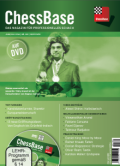 ChessBase Magazine issue 160
ChessBase Magazine issue 160
2014
June/July
http://www.chessbase.com
E-Mail
info@chessbase.com
ISSN 1432-8992
Price Euro 19.95
ChessBase Magazine issue comes with the following super
tournaments: FIDE Candidates, Gashimov Memorial, and European
Championship,where I found excellent analyses by Anand, Caruana and
Radjabov!
This DVD also offers videos by Daniel King who analyses the game of the
day!
The Opening Video column cover contributions from Dejan Bojkov on the
French 1.e4 e6 2.d4 d5 3.Nd2 Nc6,Lubomir Ftacnik Sicilian
1.e4 c5.Nf3 d6 3.Bb5 and the former chess prodigy Alexei Shirov
digs in the Semi Slav 1.d4 d5 2.c4 c6 3.Nc3 Nf6 4.e3 e6 5.Nf3 Nbd7
6.Qc2 bd6 7.Bd3 0-0 8.0-0 dxc4 9.Bxc4 b5 10.Be2 Bb7 11.e4.
Included are also 13 opening surverys: Stohl: English Opening A30
1.c4 c5 2.Nf3 Nf6 3.g3 b6 4.Bg2 Bb7 5.0-0 g6 6.Nc3 Bg7 7.d4 cxd4 8.Qxd4
d6, Moskalenko: Budapest Gambit A52 1.d4 Nf6 2.c4 e5
3.dxe5 Ng4 4.Bf4 g5, Schipkov: Dutch Defence A85 1.d4 f5 2.c4 Nf6 3.Nc3
d6 4.Nf3 g6 5.Bf4 Bg7 6.e3 0-0, Marin: Leningrad Dutch
A88 1.d4 f5 2.c4 Nf6 3.g3 g6 4.Bg2 Bg7 5.Nf3 0-0 6.0-0 d6 7.Nc3 c6
8.b3, Karolyi: Alekhine Defence B05 1.e4 Nf6 2.e5 Nd5 3.d4 d6
4.Nf3 Bg4 5.Be2 c6, Szabo: Sicilian Defence B44
1.e4 c5 2.Nf3 e6 3.d4 cxd4 4.Nxd4 Nc6 5.Nb5 d6 6.c4 Nf6 7.N1c3 a6 8.Na3
Be7 9.Be2 0-0 10.0-0 b6 11.Be3 Bb7 12.Qb3 Nd7
13.Rfd1, Bojkov/Markidis: Sicilian Defence B51 1.e4 c5 2.Nf3 d6 3.Bb5+
Nc6 4.0-0 Bd7 5.Re1 Nf6 6.c3 a6 7.Bf1 Bg4, Schandorff:
Petroff Defence C42
1.e4 e5 2.Nf3 Nf6 3.Nxe5 d6 4.Nf3 Nxe4 5.Nc3 Nxc3 6.dxc3 Be7 7.Be3,
Havasi: Ruy Lopez C84 1.e4 e5 2.Nf3 Nc6 3.Bb5 a6
4.Ba4 Nf6 5.0-0 Be7 6.d3 b5 7.Bb3 d6 8.a3 0-0 9.Nc3, Kuzmin: Slav
Defence D10 1.d4 d5 2.c4 c6 3.Nc3 dxc4 4.e4 b5 5.a4 b4
6.Nb1 Ba6 7.Qc2, Krasenkow: Queen's Gambit Accepted D26
1.d4 d5 2.c4 dxc4 3.Nf3 Nf6 4.e3 e6 5.Bxc4 c5 6.Qe2, Postny:
Grünfeld Defence D71 1.d4 Nf6 2.c4 g6 3.g3 c6 4.Bg2 d5 5.Qa4
and at lastSumets: Grünfeld Defence/Schlechter Defence D94
1.d4 d5 2.c4 c6 3.Nc3 Nf6 4.e3 g6 5.Nf3 Bg7 6.Bd3/Be2 0-0 7.0-0 dxc4
8.Bxc4 Bg4 9.Be2.
Other contributions are King:Move by Move,Reeh:Tactics,Müller:
Endgames,Rogozenco: Strategy and Knaak: The Opening trap.
Included is a book let in two languages German and English.
Conclusion: A must for all modern chess players!
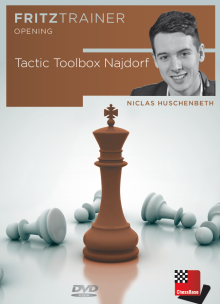
TrainingOpeningFriztrainer
Tactic Toolbox Najdorf
by Niclas Huschenbeth
2014
http://www.chessbase.com
E-Mail info@chessbase.com
Price Euro 29.90
ISBN: 978-3-86681-425-7
Pentium-Processor at 300 Mhz or higher, 64 MB RAM, Windows XP, Windows
Vista, Windows 7, DVD drive, mouse, soundcard
This work from Grandmaster Niclas Huschenbeth reminds me at a old book
from
Levy on Sicilian Sacrifices, but our well teaching Huschenbeth offers
the user of this DVD so much more!
First of all the material is split-up in sections as sacrifices as
Nd5,Bxe6,Bxb5 and all kind of pawn attacks and more, as we can
see in the following model game clipping:
Carlsen,Magnus (2814) - Nakamura,Hikaru (2751) [B92]
Tata Steel-A 73rd Wijk aan Zee (8), 23.01.2011
{1.e4 c5 2.Nf3 d6 3.d4 cxd4 4.Nxd4 Nf6 5.Nc3 a6 6.Be2 e5 7.Nb3 Be7
8.Be3 0-0 9.g4 Be6 10.g5 Nfd7 11.h4 Nb6
12.Qd2 N8d7 13.f4 exf4 14.Bxf4 Ne5 15.0-0-0 Rc8 16.Kb1 Qc7 17.h5 Rfe8
18.Ka1 Bf8 19.Nd4 Qc5} 20.g6 Nec4
21.Bxc4 Nxc4 22.Qd3 fxg6 23.hxg6 h6 24.Qg3 Qb6 25.Bc1 Qa5 26.Rdf1 Ne5
27.Nd5 Bxd5 28.exd5 Qxd5 29.Bxh6 gxh6
30.g7 Be7 31.Rxh6 Nf7 32.Qg6 Nxh6 33.Qxh6 Bf6 34.Qh8+ Kf7 35.g8Q+ Rxg8
36.Qxf6+ Ke8 37.Re1+ 1-0,
Or Giri,Anish (2714) - Gashimov,Vugar (2761) [B94]
Tata Steel-A 74th Wijk aan Zee (8), 22.01.2012
{1.e4 c5 2.Nf3 d6 3.d4 cxd4 4.Nxd4 Nf6 5.Nc3 a6 6.Bg5 Nbd7 7.Bc4 Qa5
8.Qd2 e6 9.0-0-0 b5 10.Bd5} b4!
11.Bxa8 bxc3 12.bxc3 Qxa2 13.Qe2 Be7 14.Kd2 Nxe4+ 15.Qxe4 Bxg5+ 16.f4
d5 17.Ra1 Qxa1 18.Rxa1 dxe4
19.fxg5 h6 20.g6 f5 21.Nxe6 Ke7 22.Nf4 Rd8 23.Bd5 Nb6 24.c4 Nxc4+
25.Kc3 Ne3 26.Bf7 Rd6 27.Ra5 Bd7 28.Re5+ Kf6
29.Rc5 Kg5 30.g3 Nf1 31.h4+ Kg4 32.Rd5 Rxd5 33.Nxd5 Kxg3 34.Nf6 e3
35.Bc4 Bb5 36.Nh5+ Kf2 37.Nxg7 Bxc4 38.Kxc4 e2 0-1.
Running time is over six hours! And available in German and English
language!
Included is an extra database from 50 entries.
Conclusion: Every Sicilian players
must have played throw these games!
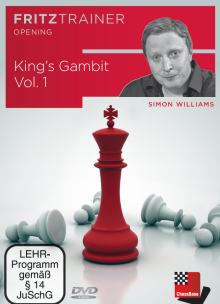 TrainingOpeningFriztrainer
TrainingOpeningFriztrainer
King's Gambit Vol.1
by Simon Williams
2014
http://www.chessbase.com
E-Mail info@chessbase.com
Price Euro 29.90
ISBN: 978-3-86681-425-7
Pentium-Processor at 300 Mhz or higher, 64 MB RAM, Windows XP, Windows
Vista, Windows 7, DVD drive, mouse, soundcard
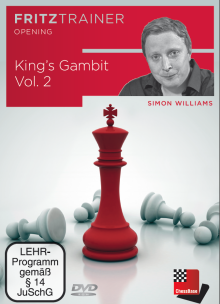 TrainingOpeningFriztrainer
TrainingOpeningFriztrainer
King's Gambit Vol.2
by Simon Williams
2014
http://www.chessbase.com
E-Mail info@chessbase.com
Price Euro 29.90
ISBN: 978-3-86681-425-7
Pentium-Processor at 300 Mhz or higher, 64 MB RAM, Windows XP, Windows
Vista, Windows 7, DVD drive, mouse, soundcard
The well known attacking player Grandmaster Simon Williams, provides
the happy user of these two well made King’s Gambit DVD with a wealth
of
smashing attack ideas on the good old King’s Gambit.
In the 19th century the King’s Gambit was the perfect weapon for the
romantic player but as we can see in the latest book from John Shaw and
these two DVD’s from Simon Williams there are a lot of new positional
insights,and that makes this DVD even more attractive for the
modern King Gambit player of today. But first to the material:
Part one holds, The Old Main Line with 1 e4 e5 2 f4 exf4 3 Bc4
Nf6 4 Nc3 c6 5 d4 d5 6 exd5 cxd5 7 Bb3! And where Williams recommends
the line with the King’side knight on e2! And this knight move is
a first class novelty!
The Shaw’s variation with 1 e4 e5 2 f4 exf4 3 Bc4 Nc6! Where I found
recommendations as 4 d4 Nf6! 5 Nc3 Bb4!
Included is the interesting Bogoljubow variation – 1 e4 e5 2 f4 exf4 3
Bc4 Nf6 4 Nc3 Nc6 with ...Bb4,
4: Sokolov’s variation – 1 e4 e5 2 f4 exf4 3 Bc4 Ne7,
1 e4 e5 2 f4 exf4 3 Bc4 d5!? And lines where Black plays an early
...Qh4+ plus some interesting alternatives.
Part two holds: The Caveman hack attack,that runs with the moves: 1 e4
e5 2 f4 exf4 3 Nf3 g5! 4 d4 g4! 5 Bxf4!?, 1 e4 e5 2 f4 exf4
3 Nf3 g5! 4 d4 Bg7 5 Nc3 d6 6 g3! is a other interesting related line.
Included are lines where black avoids moves as 3...g5,but I also
found on this DVD lines with rare moves as 3 Be2, 3 d4 and 3 Nc3.
Included is a detailed coverage of lines as 2…d5,…Bc5,…Nc6 the so
called Miles variation and again some interesting
alternatives
can be found here.
A fine example with full notes is the game: Williams,Simon -
Ohompehko,Vladimir [C33]
Swiss Open Championship, 13.07.2010
[Sokolov Defence/...Ne7]
1.e4 e5 2.f4 exf4 3.Bc4 Ne7 4.Nc3 [4.Qh5 Ng6 5.Nc3 Qe7 (5...c6 ist die
Partiestellung) 6.d4 Nc6 7.Nf3 Qb4 8.Qd5 Nd8 9.a3 Qe7 (9...Qb6 10.Qh5
c6 11.0-0 Be7 12.Ne2 0-0 13.c3 Ne6 ½-½
Schallopp,E-Steinitz,W/Koeln 1898/EXT 99 (60)) 10.0-0 d6 11.Qh5 c6
12.Bd2 Ne6 13.Rae1 Qc7 14.d5 Nd8 15.e5 0-1 Janowsky,D-Steinitz,W/Koeln
1898/EXT 99/(35)] 4...c6 5.Qh5 [5.Qf3 maybe my choice nowadays -
Williams 5...Ng6 a) 5...g5 looks very ambitous there are better ways to
reach a similar set up, mainly 3...Nc6. 6.h4 is the standard way of
meeting this idea. (6.d4 Ng6 7.Nge2 h6 (7...d6 8.0-0÷) 8.h4!
Nxh4? 9.Rxh4 gxh4 10.Bxf4±) 6...Ng6 7.d4²;
b) 5...d5 6.exd5 cxd5 7.Nxd5 Nxd5 8.Bxd5 Bd6 9.Qe4+!? Qe7 10.Qxe7+ Kxe7
11.d4 Nc6 12.c3 Re8 13.Kf2 h6 14.h4²; 6.d4 Bb4 (6...d5
7.exd5² is a good version of the old main line.) 7.Nge2 Nh4 8.Qf2
d5 9.exd5 cxd5 10.Bb5+ Nc6 11.Bxf4²;
5.Nf3!? Fischer's idea 5...d5 6.Bb3 dxe4 7.Nxe4 Nd5 8.c4 Nf6 9.Nxf6+
Qxf6 10.0-0÷] 5...Ng6 Bangiev: 'ist die Partiestellung' 6.Nf3
[6.d4 Qh4+ 7.Qxh4 Nxh4 8.Bf1!? g5 9.g3 Ng6 10.gxf4 gxf4 11.Nge2 Bg7
12.e5 f6 13.Nxf4] 6...Qe7?!= [6...Be7 7.d4 d6 8.Bxf4 '!?' (8.e5?! d5
(8...dxe5!? 9.dxe5 a) 9.Nxe5 0-0 (9...Nxe5 10.dxe5 0-0 11.Bxf4) 10.Ne2
Nxe5 11.dxe5 Be6 12.Bxe6 fxe6 13.Bxf4 Qb6³; b) 9.Bxf7+ Kxf7
10.Nxe5+ Kg8-+; 9...Qb6!? (9...0-0 10.Bd3 Nd7 11.Ne2÷) 10.Bd3
(10.Bxf4? Qxb2; 10.Ne4 Be6µ) 10...Be6µ) 9.Bd3 Na6 10.Ne2
(10.a3 Nc7 11.Ne2 Ne6³) 10...Nb4 11.0-0 Nxd3 12.cxd3 h6! (12...Be6
13.Nxf4 Nxf4 14.Bxf4 h6 15.Nd2³) 13.Bxf4 (13.Nxf4?? Nxf4 14.Bxf4
g6) 13...Be6 (13...Nxf4 14.Nxf4 g6 15.Nxg6T fxg6 16.Qxg6+ Kd7µ)
14.Be3 Qd7 15.h3 0-0-0 16.Rf2 Rdg8 17.Nh2 Nh4 18.Ng3 g6 19.Qe2
g5µ 20.Raf1 h5 21.Nxh5 g4 22.Nf6? (22.hxg4 Rxg4!? 23.Nf6 Bxf6
24.exf6 Rgg8,) 22...Bxf6 23.Rxf6 gxh3-+ 24.g4 Bxg4 25.Nxg4 Rxg4+ 26.Kh1
Rg2 27.Qd1 h2 28.Rxf7 Rg1+ 29.Bxg1 hxg1Q+ 30.Kxg1 Rg8+ 0-1 (30)
Reinderman,D (2525)-Sokolov,I (2656) Amsterdam 1999 CBM 073 [Bangiev])
8...d5 (8...Nd7! .¤f6 9.Bg5 Nf6 10.Bxf6 Bxf6÷; 8...Nxf4?
9.Qxf7+±) 9.Bxb8 dxc4 (9...Rxb8 10.exd5²) 10.Bg3 '²';
6...d5!? 7.exd5 Nd7 8.dxc6 bxc6 9.Ne4 Be7 10.0-0] 7.0-0 Qc5+ [7...d5
8.exd5 Qc5+ 9.Kh1 Qxc4 10.Re1+ Kd8 11.Ng5 Kc7 12.Nxf7 f3 13.Qxf3 Rg8]
8.Qxc5 Bxc5+ 9.d4 Bb6 10.Ne2 d6 11.Kh1! [11.c3 Ne5 12.Bb3 Nxf3+ 13.Rxf3
g5 14.h3 Nd7 15.Kh2 Nf6 16.e5 dxe5 17.dxe5 Nd7 18.g3 Nxe5 19.Rf1 Nd3
20.gxf4 g4 21.Ng3 gxh3 22.f5 Bc7 23.Kxh3 Bxg3 24.Kxg3 Rg8+ 25.Kh4 Nxc1
26.Raxc1 Ke7 27.Rce1+ Kf6 28.Rd1 Bxf5 29.Bc2 Rg4+ 30.Kh3 Rg5+ 31.Bxf5
Rxf5 32.Rd6+ Ke5 33.Rxf5+ Kxf5 34.Rd7 Rh8 35.Rxf7+ Ke4 36.Rd7 a5 37.Kg3
h5 38.Rxb7 Rg8+ 39.Kf2 Rg5 40.Ra7 Rb5 41.Re7+ Kd3 42.Re3+ Kc2 43.Re2+
Kb1 44.b3 Rf5+ 45.Kg3 Rd5 46.c4 Rd3+ 47.Kh4 Rc3 48.a4 Rc2 49.Re8 Kb2
50.Rb8 Rc3 51.Rb6 Rxb3 52.c5 Ka3 53.Rxc6 Rc3 54.Rc8 Kxa4 55.c6 Rc4+
56.Kxh5 Kb5 57.Kg5 Rxc6 58.Rxc6 Kxc6 59.Kf4 a4 0-1 (59) Williams,S
(2487)-Van den Doel,E (2580) Dresden 2007] 11...Bg4 12.c3 Bc7 13.Nxf4
Nxf4 14.Bxf4 0-0 15.Bg3 Nd7 16.Ng5 Bh5 17.Ne6 fxe6 18.Bxe6+ Bf7 19.Bxd7
Bxa2 20.Rxf8+ Rxf8 21.h4 Bc4 22.Rxa7 Ba6 23.Bxc6 Bb6 24.Rxa6 Rf1+
25.Kh2 bxa6 26.Bd5+ Kf8 27.Bxd6+ Ke8 28.Bc6+ Kd8 29.e5 Bc7 30.Ba3 Ra1
31.Kg3 Rxa3 32.bxa3 Ba5 33.d5 Bxc3 34.Kf4 Bb2 35.a4 Ke7 36.Ke4 a5 1-0.
Running time for both DVD's is over 11 hour!
Conclusion: Smashing!





